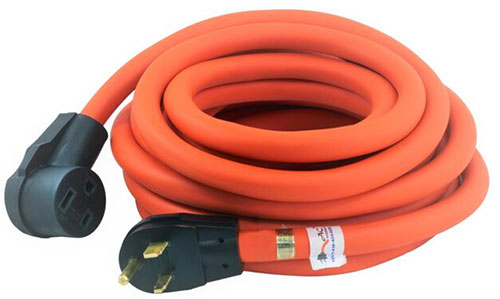了解延长线上的警告标签含义
当您购买了 AC Connectors 的柔性适配器或延长线时,可能会注意到包扎在电缆上的警告标签。您可能想知道这些标签的用处,是不是有什么要注意的。请放心,这些警告标签是所有品牌和大多数电子产品的标配。
 警告标签(如上图中交流连接器延长线上的警告标签)是所有品牌的标配,使用前应先了解其含义,以免人员受伤和设备损坏。(图片来源:AC Connectors)
警告标签(如上图中交流连接器延长线上的警告标签)是所有品牌的标配,使用前应先了解其含义,以免人员受伤和设备损坏。(图片来源:AC Connectors)
尽管许多标签警告内容都是常识,但不防了解一下以防搞错:
- 检查电线类型
- 确定电缆是否注明用于室内还是室外。仅用于指定环境。如果标为“室外”,则室内和室外使用都安全。
- 检查外露电线
- 确保没有外露电线。如果发现有外露,则弃用并更换新电缆,以免造成触电或火灾。
- 核实功率
- 确认家电器的功率未超过电缆的额定值。过载可能会造成电线过热或故障。揭示:功率 = 安培数 x 伏特数。
- 避免物理损伤
- 切勿从门道或墙壁、天花板或地板孔洞拉线,因为这可以造成电线卡塞或外露,从而导至过热或触电。
- 插入时确认电器断电
- 确保将电线插入插座前先关闭家电,以防产生电弧而造成触电。
- 正确插入插头
- 插头要完全插入插座中。电器运转时避免插头任何部分外露。
- 保持插头完整性
- 请勿拆除或改装插头上的插脚。如果插头损坏,则更换整条电线或找电工维修。
- 远离水源
- 连接处要远离水源。如果环境潮湿则要使用防水套罩。
- 宠物和儿童保护
- 电缆应位于远离宠物和儿童,以防被咬破并造成触电危险。
- 使用前展开
- 使用前先展开电缆,以防过热。成卷电缆会造成热量集中,引起外皮融化。
- 避免拖拽
- 避免拖拽电缆,因为这可能造成电缆被卡或破皮,从而露出里面的电线。
- 避免绊倒危险
- 电线可能会造成绊倒危险。用锥筒或色彩鲜艳的护套突出它们的位置。
- 拔出不当
- 请勿通过拉扯电线将电线从插座中拽出。始终通过握住插头末端方式将其安全拔出。
- 仅作临时使用
- 延长线仅作临时使用。避免永久性地不间断使用它们。如果必须要不间断使用,则需定期检查电缆状况。
- 不使用时拔下
- 不使用时一定要拔下延长线或柔性适配器的插头,以确保安全。
了解延长线上的警告标签含义对确保安全和防止潜在危险至关重要。这些标签为正确使用、维护和预防提供了重要指示,以避免触电、火灾和其他风险。使用前请务必先确定电线类型,检查是否损坏,确认功率,并确保使用环境正确。只要遵循这些常识,小心使用延长线,就能安全地享受其带来的便利,而不会影响安全。请记住,这些准则对所有品牌和类型的延长线都是标准要求,对保护设备和人身安全都非常重要。

Have questions or comments? Continue the conversation on TechForum, Digi-Key's online community and technical resource.
Visit TechForum







